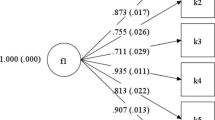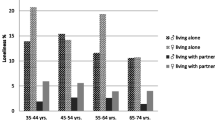Abstract
Purpose
Homecare workers’ diversity of emotional demands and their relation to mental health problems have not yet been fully explored. The purpose of this study is to investigate the types of emotional demands on homecare workers and the association of these demands with depression.
Method
Data were collected from two surveys of a random sample of 1,599 homecare workers (June 2003–September 2003 and December 2003–February 2004). Depression was assessed using a 20-item RCES-D screening scale.
Results
Homecare workers appeared to have a variety of emotional demands: unfair treatment, client’s family abuse, unmet care needs, client health, and emotional suppression. In general, homecare workers were more likely to be exposed to their client health and emotional suppression (mean scores = 1.46–3.07) than to be exposed to unmet care needs, unfair treatment, and client’s family abuse (mean scores = 1.02–1.38). After adjusting for potential confounders, four emotional-demand factors (excluding the client health factor) were significantly associated with a high risk of subthreshold depression at Wave 1. In particular, the factor “unmet care needs” was an essential predictor of 6-month subthreshold depression at Wave 2.
Conclusion
This study illustrated the diversity of emotional demands among homecare workers and their association with depression. Our mixed findings regarding the cross-sectional and longitudinal analyses suggested that further research should refine the measurement of emotional demands and their relationship with mental health among homecare workers.


Similar content being viewed by others
References
Aderson NR (2008) Safe in the city. Home Healthc Nurse 26(9):534–540
Bakker AB, Demerouti E (2007) The job demands-resources model: state of the art. J Manag Psychol 22(3):309–328
Bonde JP (2008) Psychosocial factors at work and risk of depression: a systematic review of the epidemiological evidence. Occup Environ Med 65(7):438–445
Christiansen RH, Nielsen HO (2007) Survey highlights rise in psychosocial demands at work. Trends in working conditions 2000–2005. European foundation for the improvement of living and working conditions, Dublin
Cousineau MR (2000) Providing health insurance to IHSS providers (home care workers) in Los Angeles County. California HealthCare Foundation, Los Angeles
Covinsky KE, Newcomer R, Fox P, Wood J, Sands L, Dane K, Yaffe K (2003) Patient and caregiver characteristics associated with depression in caregivers of patients with dementia. J Gen Intern Med 18(12):1006–1014
Denton M, Zeytinoglu IU, Davies S (2003) Organizational change and the health and well being of home care workers. In: Denton M (ed) Social and economic dimensions of an aging population research papers. McMaster Univeristy Soical Sciences, Hamilton
Denton MA, Zeytinoglu IU, Davies S, Hunter D (2006) The impact of implementing managed competition on homecare workers’ turnover decisions. Healthc Policy 4:106–123
Eaton WW (2001) Center for epidemiologic studies depression scale-revised (CESD-R). In: VandeCRek L, Jackson TL (eds) Innovations in clinical practice. Professional Pesource Exchange, Sarasota, pp 295–297
Eaton WW, Muntaner C, Smith C, Tien A (1999) The revised center for epidemiologic Studies Depression Scale (RCES-D). In: Maruish ME (ed) The use of psychological assessment for treatment planning and outcome assessment. Lawrence Erlbaum Associates, Mahwah, NJ, pp 363–378
Ebenstein H (1998) They were once like us: learning from homecare workers who care for the elderly. J Gerontol Soc Work 30(3/4):191–201
Eustis N, Kane R, Fischer L (1993) Home care quality and the home care worker: beyond quality assurance as usual. Gerontol 33(1):64–73
Findorff MJ, McGovern PM, Wall M, Gerberich SG, Alexander B (2004) Risk factors for work related violence in a health care organization. Inj Prev 10(5):296–302
Fitzwater ED, Gates DE (2000) Violence and home care: a focus group study. Home Healthc Nurse 18(9):596–605
Fleming G, Taylor BJ (2007) Battle on the home care front: perceptions of home care workers of factors influencing staff retention in Northern Ireland. Health Soc Care Comm 15(1):67–76
Frith H, Kitzinger C (1998) Emotion work’ as a participant resource: a feminist analysis of young women’s talk-in-interaction. Sociology 32(2):299–320
Grandey A (2000) Emotional regulation in the workplace: a new way to conceptualize emotional labour. J Occup Health Psychol 5:95–110
Gross JJ (2001) Emotion regulation in adulthood: timing is everything. Curr Dir Psychol Sci 10:214–219
Hayashi R, Gibson JW, Weatherley RA (1994) Working conditions in home care: a survey of Washington state’s home care workers. Home HealthC Serv Q 14(4):37–48
Hochschild AR (1983) The managed heart: commercialization of human feeling. University of California Press, Berkley
Kadushin G, Egan M (2006) Unmet patient need in home care under managed care. J Gerontol Soc Work 47(3–4):103–120
Kendler KS, Karkowski LM, Prescott CA (1999) Causal relationship between stressful life events and the onset of major depression. Am J Psychiatry 156(6):837–841
Kesselring A, Krulik T, Bichsel M, Minder C, Beck J, Stuck A (2001) Emotional and physical demands on caregivers in home care to the elderly in Switzerland and their relationship to nursing home admission. Eur J Public Health 11(3):267–273
Kessler RC (1998) The effects of stressful life events on depression. Annu Rev Psychol 48:191–214
Kim IH, Geiger-Brown J, Trinkoff A, Muntaner C (2010) Physically demanding workloads and risks of musculoskeletal disorders in homecare workers in the USA. Health Soc Care Comm 18(5):445–455
Kruml S, Geddes D (2000) Exploring the dimensions of emotional labor: the heart of Hochschild’s work. Manage Commun Q 14(1):8–49
Lewig KA, Dollard MF (2003) Emotional dissonance, emotional exhaustion and job satisfaction in call centre workers. Eur J Work Organ Psychol 12(4):366–392
Miller K, Birkholt M, Scott C, Stage C (1995) Empathy and burnout in human service work: an extension of a communication model. Commun Res 22:123–147
Montgomery AJ, Panagopolou E, Benos A (2005) Emotional labour at work and at home among Greek health-care professionals. J Health Organ Manage 19:395–408
Muntaner C, Li Y, Xue X, Thompson T, Chung H, O’Campo P (2006) County and organizational predictors of depression symptoms among low-income nursing assistants in the USA. Soc Sci Med 63(6):1454–1465
Muthén B, Kaplan D (1985) A comparison of some methodologies for the factor analysis of non-normal Likert variables. Brit J Math Stat Psy 38(2):171–189
Naring G, van Droffelaar A (2007) Incorporation of emotional labor in the Demand-Control-Support Model: the relation with emotional exhaustion and personal accomplishment in Nurses In: Charmine EJ, Hatel W, Ashkanasy NM, Zerbe WJ (eds), Functionality, intentionality and morality. Emerald Group Publishing Limited, Bingley, pp 221–236
Netterstrøm B, Conrad N, Bech P, Fink P, Olsen O, Rugulies R (2008) The relation between work-related psychosocial factors and the development of depression. Epidemiol Rev 30(1):118–132
Olsson E, Ingvad B (2001) The emotional climate of care-giving in home-care services. Health Soc Care Comm 9(6):454–463
Rae HM (1998) Managing feelings: caregiving as emotion work. Res Aging 20(1):137–160
Schermelleh-Engel K, Moosbrugger H, Muller H (2003) Evaluating the fit of structural equation models: tests of significance and descriptive goodness-of-fit measure. Meth Psycho Res Online 8(2):23–74
Söderfeldt B, Söderfeldt M, Jones K, O’Campo P, Muntaner C, Ohlson CG, warg LE (1997) Does organization matter? A multilevel analysis of the demand-control model applied to human services. Soc Sci Med 44(4):527–534
Steinberg RJ, Figart DM (1999) Emotional demands at work: a job content analysis. Annals 561:177–191
Suhr D (2003) Reliability, exploratory & confirmatory factor analysis for the scale of athletic priorities. In :Proceedings of the Twenty-eight Annual SAS Conference (SUGI 28), pp 274–28
Tepper K, Hoyle RH (1996) Latent variable models of need for uniqueness. Multivar Behav Res 31(4):467–494
van Daalen G, Willemsen TM, Sanders K, van Veldhoven MJPM (2009) Emotional exhaustion and mental health problems among employees doing “people work”: the impact of job demands, job resources and family-to-work conflict. Int Arch Occup Environ Health 82:291–303
van Vegchel N, de Jonge J, Söderfeldt M, Dormann C, Schaufeli W (2004) Quantitative versus emotional demands among Swedish human service employees: moderating effects of job control and social support. Int J Stress Manage 11(1):21–40
Wieclaw J, Agerbo E, Mortensen P, Burr H, Tuchsen F, Bonde J (2008) Psychosocial working conditions and the risk of depression and anxiety disorders in the Danish workforce. BMC Public Health 8(1):280. doi:10.1186/1471-2458-8-280
Williams J, Lyons B, Rowland D (1997) Unmet long-term care needs of elderly people in the community: a review of the literature. Home HealthC Serv Q 16(2):93–119
Zapf D (2002) Emotion work and psychological well-being: a review of the literature and some conceptual considerations. Hum Resour Manage R 12:237–268
Zapf D, Vogt C, Seifert C, Mertini H, Isic A (1999) Emotion work as a source of stress. The concept and development of an instrument. Eur J Work Organ Psychol 8(3):371–400
Acknowledgments
We would like to acknowledge Jeanne Geiger-Brown, Patricia Patchet-Golubev, and Tom Beechinor, who provided help and support. The Ontario Ministry of Health and Long Term Care provided support to CAMH for funding for fellows and infrastructure. The views expressed [here] do not necessarily reflect those of the Ministry of Health and Long Term Care.
Conflict of interest
The authors declare that they have no conflict of interest.
Author information
Authors and Affiliations
Corresponding author
Rights and permissions
About this article
Cite this article
Kim, IH., Noh, S. & Muntaner, C. Emotional demands and the risks of depression among homecare workers in the USA. Int Arch Occup Environ Health 86, 635–644 (2013). https://doi.org/10.1007/s00420-012-0789-x
Received:
Accepted:
Published:
Issue Date:
DOI: https://doi.org/10.1007/s00420-012-0789-x




